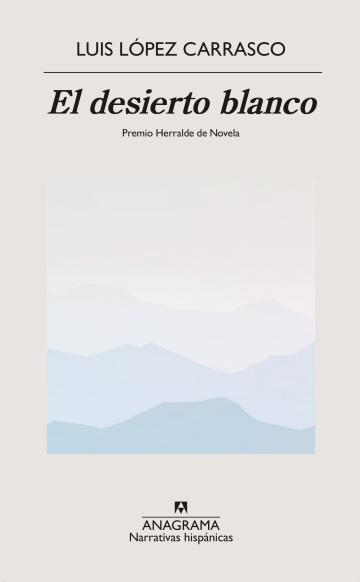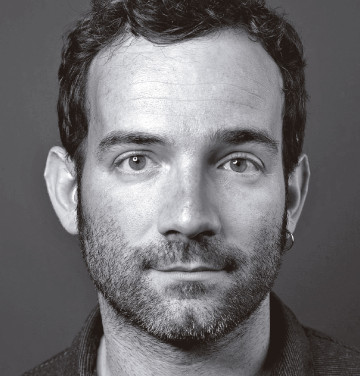| PAGES | 168 |
| SERIES | Narrativas hispánicas |
| PUBLICATION | 22/11/2023 |

SERIES:Narrativas hispánicas
2023 Herralde Novel Prize
Nine strangers escape from bombings in a hot air balloon. They must decide which one of them has to jump into the ocean so that the rest of them can get to a deserted island safely and start a new civilization. The passengers are the only survivors of a worldwide war that has made the world we know disappear. What is at stake, in reality, isn’t the future of the human species, but a temporary job as a salesman in a large department store.
“That’s what the job search was like in 2011,” Carlos, the novel’s narrator could write. He tries to rescue the world he lived in from an uncertain future alongside other close and complicit voices; a world that “we can’t return to for reasons that we know all too well.” From this enigmatic exile, the narrator traces the dark, subterranean currents that transformed the lives of every person he knew, taking them so far away, through memories that appear to be anecdotal.
Although the first quarter of the 21st century seems to be irrecoverable, by narrating it and telling the story again like fiction, Carlos might be able to decipher and rediscover—as his older brother’s increasingly fantastical and delirious emails remind him—the keys to a time period that seemed to be immune to fables and adventure, where the only kind of fiction that was tolerated was the kind that allowed people to fight for a shitty job.
Luis López Carrasco has written an exceptional novel about a generation seen from a foreign space and time period; about characters who inhabit a strange territory that drives them to confront what they were and what they are. In that back and forth that makes up memory, its protagonists will attempt to reconstruct, and, therefore, understand the invisible renunciations, the necessary alliances, and the unforeseen shapes of utopia.
“Through the magnificent parts that make up El desierto blanco, which fit perfectly together, a story that becomes the story of our lives appears: modern work, organized tourism, friendship and its rituals, family tales, memory as pain and consolation. Bold, compromised, and also incredibly sad, with an exceptional talent for scenes and details, Luis López Carrasco has composed a highly precise artifact that takes away our security. It contains no waste.” —Gonzalo Ponton Gijón
“With intelligent narrative consciousness, a sense of humor, and imagery with an unusual power, López Carrasco maps out urbanization as a deserted island and poetry as a developable terrain: melancholy is an unfulfilled need, sadness in literature has a bourgeois touch, and the body and its affects are always naked in the face of capitalism. A rarity that truly shines.”
—Marta Sanz
“All of the futurist novels describe our current fears, but many of them do it with pessimism, proclaiming the imminent catastrophe and assuming defeat in advance. El desierto blanco imagines a very near future in which—without nostalgia, but in a beautiful melancholic tone—we haven’t forgotten who we were and who we are, about friendship and family, about love and tenderness, about rage and rebellion, about play and fantasy, about creation and memory, about all the things that could save us from the Apocalypse. Luis López Carrasco has written a formally daring, fun, endearing, witty, stimulating novel, not unlike our childhood dream of traveling to the moon.” —Juan Pablo Villalobos
“Extreme situations; unresolved enigmas. Luis López Carrasco doesn’t let up—he hypnotizes and drags us all along.” —Ana Cañellas
“The fantasy of a future catastrophe effectively serves López Carrasco’s goal of taking some distance (inventing it) in order to contemplate a desolate reality that still exists with difficult objectivity.” —Dómingo Ródenas, Babelia, El País
“A fabulous world, like one in a commercial, becomes inhospitable and unattainable for an entire generation. A well-trained, educated, and ambitious generation that nonetheless has no place in their own country. (…) There are many depths in this story that, by virtue of being set in the future, allows the narrator to tell us about our time through different eyes, with an objectivity that is impossible today.” —Sotileza, El Diario Montañés
“What this unique novel wants to inspire—and does so with good ideas and resources—is the sticky sensation that we’ve spent a long time living in an altered reality, in the middle of an environment that has become a lie.” —Juan Marqués, La Lectura, El Mundo
“In El desierto blanco, the generation completely touched by the financial crisis is immersed in a futuristic strangeness: their story is constructed with winks to science fiction in a landscape where mirrors obscure the building, so that ‘power gives back a collective image,’ he writes.” —Andrea Aguilar, El País
“El desierto blanco seems like an exact description of Leibniz’s monads: simple, indivisible, autarkic figures that contain all the complexity of the world in their simplicity.” —Ricardo Baixeras, El Periódico
“Characters who have been alienated by dramatic circumstances, extreme situations, and lacerating moral dilemmas make up a web of unique narrative adventures. A longing for a more humane time and society appears here, still far away from sophisticated technologies and deadly war advances that can link the futuristic with the prehistoric. An interesting novel that is a complete parable about uncontrolled and apparent social progress.” —Jesús Ferrer, La Razón
“A collective pain that has been unnamed until now has found its voice, and this is one of the most dignified and difficult functions of this ancient art we call Literature.” —José Daniel Espejo, La Verdad
“With his first novel, Luis López Carrasco manages to write a remarkable book of great intelligence, with prose that at times achieves excellence, especially when it comes to the description of landscapes.” —Basilio Pujante, La Verdad
“In short, this is a novel about a generation located in a foreign time and space. Characters carry the weight of the world on their shoulders as they face the challenge of rebuilding civilization from an island.” —Ana Gómez Viñas, El Economista
| PAGES | 168 |
| SERIES | Narrativas hispánicas |
| PUBLICATION | 22/11/2023 |
TRANSLATION RIGHTS SALES
- UK & USA (Granta)
- China (The Writers Publishing House)


Luis López Carrasco (Murcia, 1981) is a writer and filmmaker. He co-founded the audiovisual collective Los Hijos, and his work as director has been displayed in numerous international festival and contemporary art centers around various cities in Spain, London, Manchester, Paris, and New York. His latest movie, El año del descubrimiento, premiered during the Rotterdam International Film Festival and has won several national and international awards, including the Goya Prizes for best documentary and best editing. He is the co-author of the book La aritmética de la creación. Entrevistas con productores del cine español contemporaneo and publishedEuropa, a short narrative framed by science fiction, in 2014. He currently works as an assistant teacher at the Universidad de Castilla-La Mancha.


